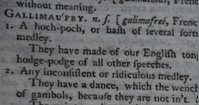 Derek H Kiernan-Johnson has just put his paper “Telling Through Type: Typography and Narrative in Legal Briefs” on SSRN (hat tip Law & Humanities Blog). He notes that Chief Judge Frank Easterbrook has (pdf) deprecated
Derek H Kiernan-Johnson has just put his paper “Telling Through Type: Typography and Narrative in Legal Briefs” on SSRN (hat tip Law & Humanities Blog). He notes that Chief Judge Frank Easterbrook has (pdf) deprecated
bad typography, home-brewed by lawyers just because word-processing software allows you to bypass professional printers. Unfortunately, … [lawyers] have not gone to printers’ school. Desktop publishing does not imply a license to use ugly or inappropriate type and formatting — and I assure you that Times New Roman is utterly inappropriate for long documents despite the fact that it is the default in some word-processing programs. It is designed for narrow columns in newspapers, not for briefs.
In my post Typography for Lawyers, I briefly referred to the website of the same name maintained by Matthew Butterick (interviewed here; reviewed here) as a remedy for these ills. Indeed, Dan Michaluk on Slaw expressed his preference for Helvetica the movie as well as the modern, minimalistic and neutral font.
In Kiernan-Johnson’s view, however, typography has the potential to go very much further: the
…shapes, the spacing, of letters and of words can reinforce, compliment, and independently create narrative meaning. Or, intentionally or unintentionally, it can cut against it.







